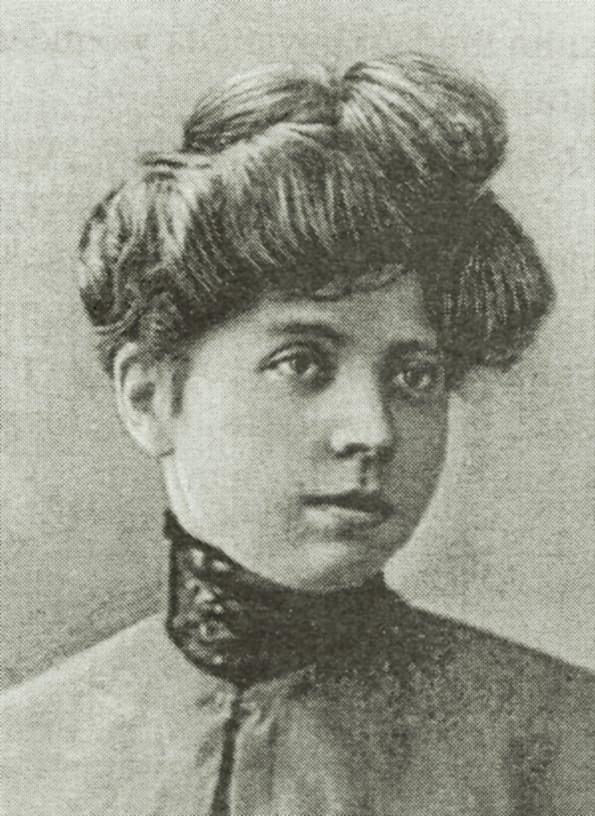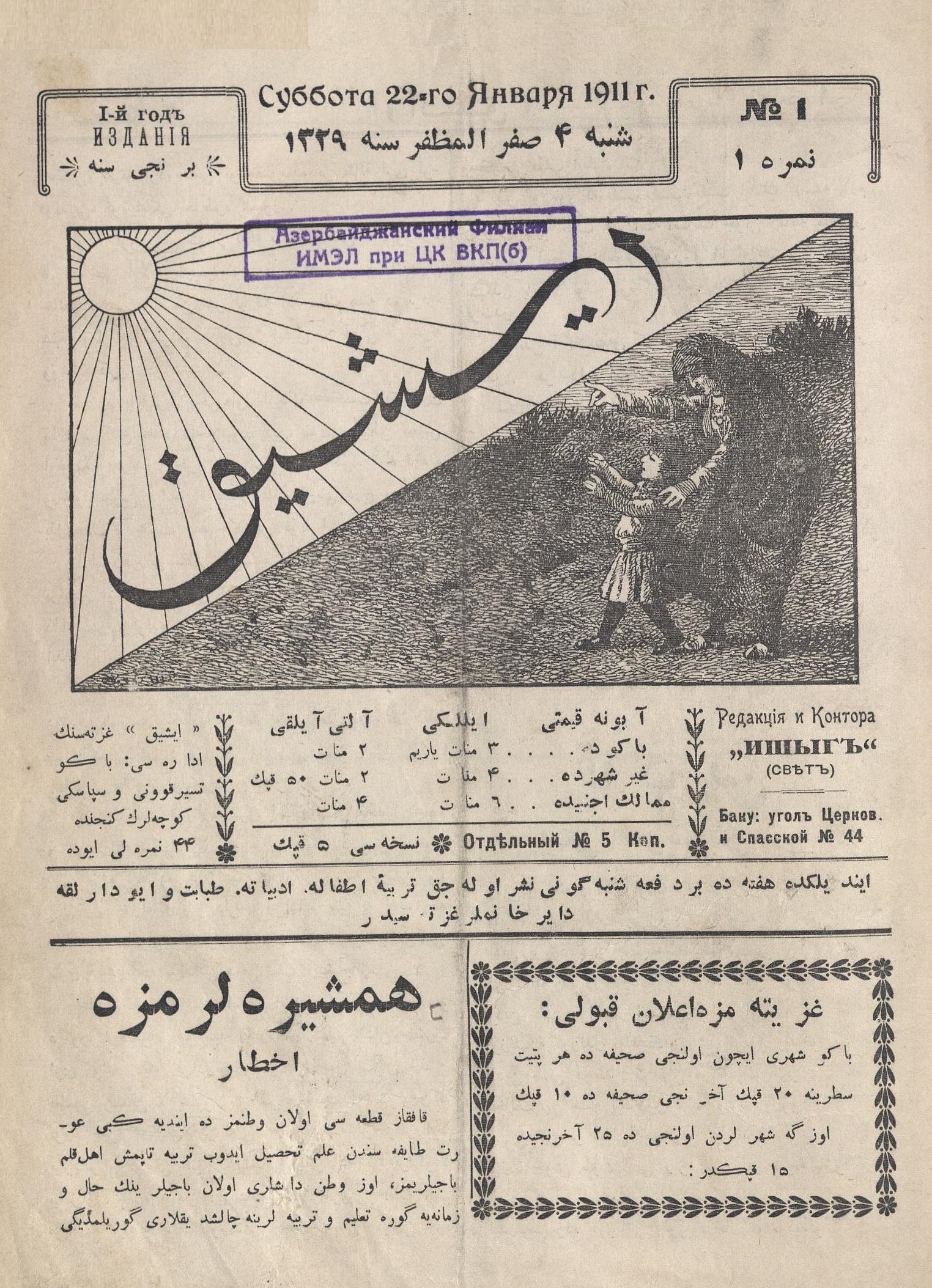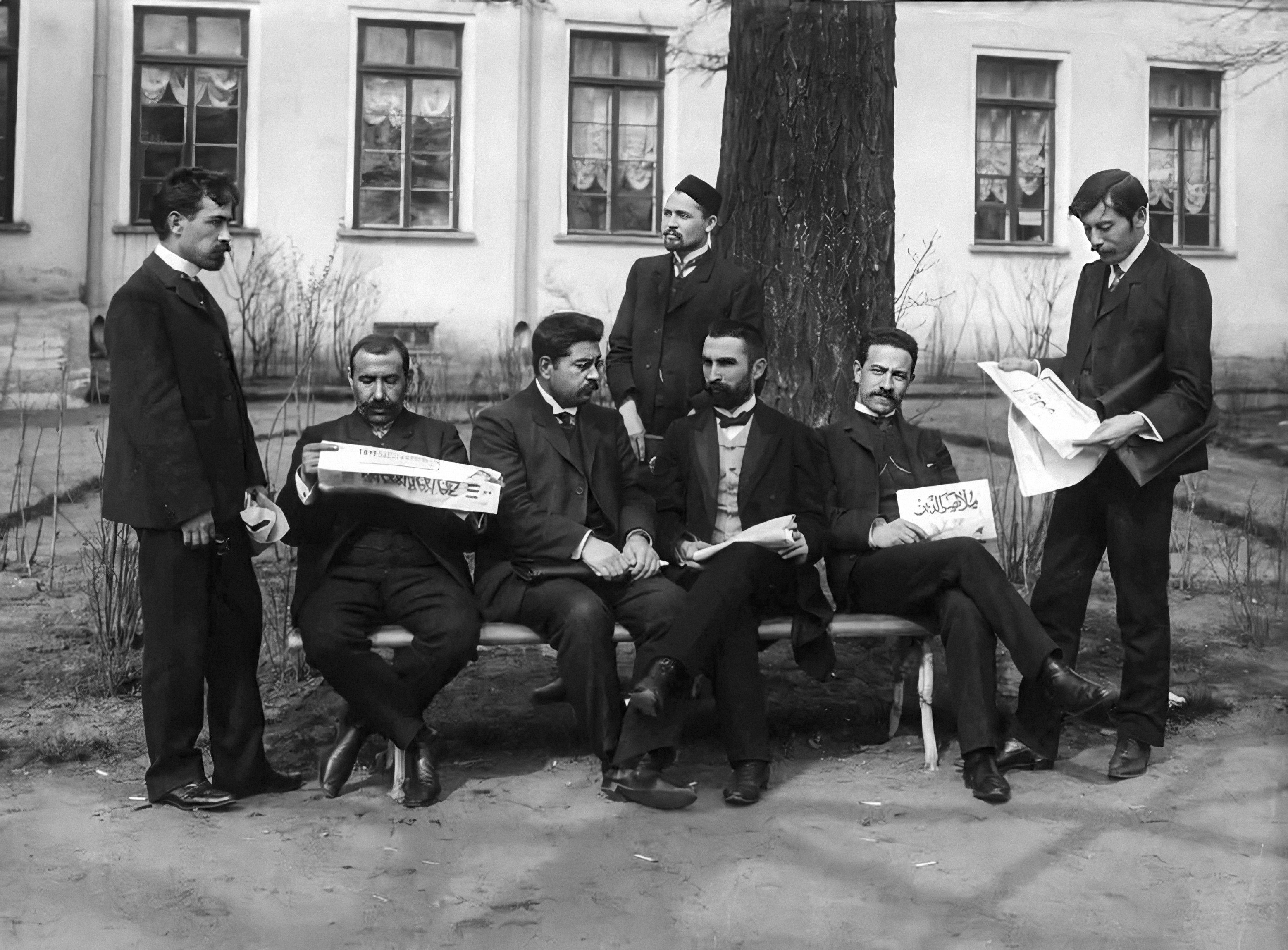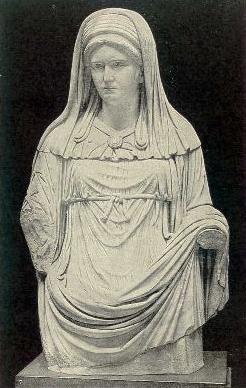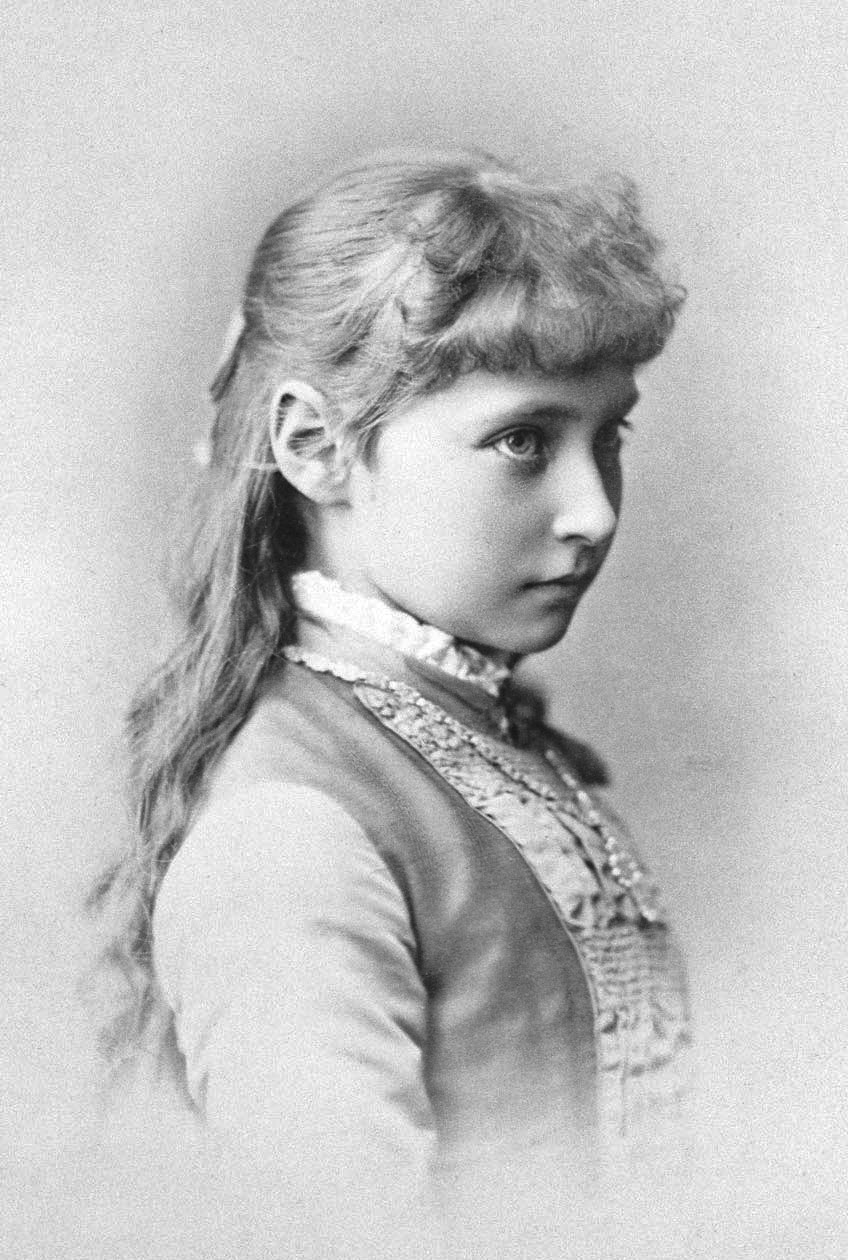|
Ishig
''Ishig'' was the first Azerbaijani-language women's publication. The first issue of newspaper was published on January 22, 1911, and its publication continued until the end of 1912, during which 68 issues were released. Background Although the first women's publication in Russia Empire was the magazine ''Nevinnoye uprajneniya'' ( - "Innocent Exercises"), edited by Princess Dashkova in the 18th century, the advocacy magazine for women's rights, ''Soyuz jenshin'' ( - Women's Union), was published between 1907 and 1909. In the social life of Russian Turks, the first women's magazine was '' Alem-i-nisvan''. It was edited by Şefiqa Gaspıralı, the daughter of Ismail bey Gasprinski, the editor of the '' Terciman'' newspaper. Meanwhile, in the Ottoman Empire, there were two publications for women - the weekly illustrated magazines ''Kadinlar Gazetesi'' and ''Nisvan''. In the early years following Azerbaijan's Sovietization, the magazine ''Sharg gadini'' (Oriental woman) was publis ... [...More Info...] [...Related Items...] OR: [Wikipedia] [Google] [Baidu] |
Mustafa Bey Alibeyov
Mustafa Bey Alibeyov (1872, Shaki, Azerbaijan, Nukha - 1945) was a publicist, writer, playwright, and lawyer. He was the publisher of Ishig, Ishig newspaper, a member of "Nijat" charity society, "Help to the needy" society, secretary of Hidayat Charitable Society, "Hidayat" charity society, and a member of Ahrar Party (Azerbaijan), Ahrar party. Life and education Mustafa Bey Alibeyov was born in 1872 in the city of Shaki, Azerbaijan, Sheki in Azerbaijan. In his first years of education, he learned the Arabic-Persian languages perfectly. He studied at the Russian-Tatar school in Sheki. He graduated from Tiflis gymnasium in 1892. During these years, he studied Russian and French. Career and social activity In 1892, he started working as a translator of the chief investigator in the district court of Baku Governorate, Baku governorate. He was a member of "Nijat" charitable society. In addition to being famous as a lawyer, he was also known as a literary critic. He worked as a ... [...More Info...] [...Related Items...] OR: [Wikipedia] [Google] [Baidu] |
Khadija Alibeyova
Khadija Alibeyova (, 1884 – 1961) was the first female editor in Azerbaijan, and also an educator, publicist and publisher. She is also credited as the first female gynecologist physician in Azerbaijan in some sources. Personal life and family Khadija Subhangulova was born in 1884 in Tbilisi. Her father, Aladdin Subhanguliyev, was a respected intellectual in Tbilisi and was deeply committed to educating his daughter. After graduating from the Tbilisi Girls Gymnasium, Khadija studied medicine at the Transcaucasian Olginski Institute of Obstetrics and Gynecology. She was married to the famous Azerbaijani lawyer and publicist Mustafa Bey Alibeyov in 1907. They had six children and one of them passed away at a young age. All five remaining children received higher education. Their daughter, Aruziyya Alibeyova, was the first economics doctor in Azerbaijan. Career After her marriage to Alibeyov, she became more actively involved in social and cultural life. Khadija Alibeyova beca ... [...More Info...] [...Related Items...] OR: [Wikipedia] [Google] [Baidu] |
Aligulu Gamgusar
Aligulu Gamgusar or Aligulu Alekper oglu Najafov ( Azerbaijani: ''Əliqulu Məşədi Ələkbər oğlu Nəcəfov''; b. 24 May 1889, Nakhcivan, Russian Empire – d. Tiflis, Georgian Democratic Republic, 14 March 1919) was an Azerbaijani poet, journalist, publicist, public figure and writer. A prominent representative of the revolutionary-satirical direction of Azerbaijani literature. Life Aligulu Gamgusar was born on 24 May 1880, in Nakhichivan. His maternal grandfather, Meshadi Asad, wrote poems under the pseudonym "Maddakh", his uncle is one of the famous writers of Nakhchivan named Mohammad Huseyin Najafov. From the age of 8, Aligulu studied Arabic and Persian at the spiritual-religious school. Still studying at school, he began to write his first verses. In 1892, he entered a three-class Russian school. In 1896, due to his father's illness, his education was interrupted. He lived for some time in Tabriz and Khorasan, then he lived in Nakhichivan, Julfa. He wrote poems and ... [...More Info...] [...Related Items...] OR: [Wikipedia] [Google] [Baidu] |
Omar Faig Nemanzadeh
Omar Faig Loman oglu Nemanzadeh (, ) was an Azerbaijani publicist, journalist, teacher, founder and owner of Gheyrat Press and co-founder of Molla Nasraddin (magazine), ''Molla Nasreddin'' magazine, public figure. Early years Omar Faig Nemanzadeh was a Meskhetian Turks, Turkish Meskhetian and was born in 1872, in the village of Atsquri, Azğur (Atsquri in Georgian language, Georgian), in the Akhaltsikhe uezd of the Tiflis Governorate. When he was 10, his family decided to send him to the Transcaucasian Teachers Seminary in Gori, Georgia, Gori where prominent people of the Caucasus such as Nariman Narimanov, Jalil Mammadguluzadeh, Uzeyir Hajibeyov and others studied. However his mother was a devout Muslim and she was against his education in a school in a Christianity, Christian town. That is why he was sent to Istanbul and studied at the Fatih Madrasah. Omar Faig treated religious education skeptically and after two years, he transferred to secular Dar ush-Shafak seminary, where ... [...More Info...] [...Related Items...] OR: [Wikipedia] [Google] [Baidu] |
Jalil Mammadguluzadeh
Jalil Huseyngulu oghlu Mammadguluzadeh (, ; 22 February 1869 – 4 January 1932), was an Azerbaijani people, Azerbaijani List of satirists and satires, satirist and writer. He was the founder of Molla Nasraddin (magazine), ''Molla Nasraddin'', a satirical magazine that would greatly influence the genre in the Middle East and Central Asia. Mammadguluzadeh is considered to be one of the first women's rights activists in Azerbaijan and Middle East and had a big role in founding the first women's magazine in Azerbaijan. Biography Early life Mammadguluzadeh was born in the territory of the modern-day Nakhchivan (city), Nakhchivan exclave of Azerbaijan. He first joined ecclesiastical school and went to Nakhchivan city school and learned Russian at the age of thirteen. Mammadguluzadeh considered himself to be Iranian, and was proud of the fact that his ancestors hailed from Iran. In 1882 he joined the Gori Pedagogical Seminary in the Georgian city of Gori and it was here that he dev ... [...More Info...] [...Related Items...] OR: [Wikipedia] [Google] [Baidu] |
Molla Nasraddin (magazine)
''Molla Nasraddin'' (, ; , old orthography: ) was an eight-page Azerbaijani satirical periodical published in Tiflis (1906–17), Tabriz (in 1921) and Baku (1922–33). From the second issue of 1931, the magazine was called ''Allahsyz'' (; ; meaning "Godless") in the Azerbaijani and occasionally Russian languages. The magazine was "read across the Muslim world from Morocco to East Asia". It was founded by Jalil Mammadguluzadeh (1869–1932) and Omar Faig Nemanzadeh (1872–1937), and named after Nasreddin, the legendary Sufi wise man-cum-fool of the Middle Ages."New-York Books: When Satire Conquered Iran" nybooks.com, 18 September 2012. Columnists wrote articles that "boldly satirized politics, religion, colonialism, Westernization, and modernization, ... [...More Info...] [...Related Items...] OR: [Wikipedia] [Google] [Baidu] |
Sharia
Sharia, Sharī'ah, Shari'a, or Shariah () is a body of religious law that forms a part of the Islamic tradition based on Islamic holy books, scriptures of Islam, particularly the Quran, Qur'an and hadith. In Islamic terminology ''sharīʿah'' refers to immutable, intangible divine law; contrary to ''fiqh'', which refers to its interpretations by Ulama, Islamic scholars. Sharia, or fiqh as traditionally known, has always been used alongside urf, customary law from the very beginning in Islamic history; has been elaborated and developed over the centuries by fatwa, legal opinions issued by mufti, qualified jurists – reflecting the tendencies of Schools of Fiqh, different schools – and integrated and with various economic, penal and administrative laws issued by Muslims, Muslim rulers; and implemented for centuries by Qadi, judges in the courts until recent times, when secularism was widely adopted in Islamic societies. Traditional Principles of Islamic jurisprudence, theory o ... [...More Info...] [...Related Items...] OR: [Wikipedia] [Google] [Baidu] |
Veil
A veil is an article of clothing or hanging cloth that is intended to cover some part of the human head, head or face, or an object of some significance. Veiling has a long history in European, Asian, and African societies. The practice has been prominent in different forms in Judaism, Christianity, and Islam. The practice of veiling is especially associated with women and sacred objects, though in some cultures, it is men, rather than women, who are expected to wear a veil. Besides its enduring religious significance, veiling continues to play a role in some modern secular contexts, such as wedding customs. History Antiquity Elite women in ancient Mesopotamia and in the Rise of Macedon, Macedonian and Persian Empire, Persian empires wore the veil as a sign of respectability and high status. The earliest attested reference to veiling is found a Middle Assyrian Empire, Middle Assyrian law code dating from between 1400 and 1100 BC. Assyria had explicit sumptuary laws detailin ... [...More Info...] [...Related Items...] OR: [Wikipedia] [Google] [Baidu] |
Conservatism
Conservatism is a Philosophy of culture, cultural, Social philosophy, social, and political philosophy and ideology that seeks to promote and preserve traditional institutions, Convention (norm), customs, and Value (ethics and social sciences), values. The central tenets of conservatism may vary in relation to the culture and civilization in which it appears. In Western culture, depending on the particular nation, conservatives seek to promote and preserve a range of institutions, such as the nuclear family, organized religion, the military, the nation-state, property rights, rule of law, aristocracy, and monarchy. Conservatives tend to favor institutions and practices that enhance social order and historical continuity. The 18th-century Anglo-Irish statesman Edmund Burke, who opposed the French Revolution but supported the American Revolution, is credited as one of the forefathers of conservative thought in the 1790s along with Savoyard statesman Joseph de Maistre. The first ... [...More Info...] [...Related Items...] OR: [Wikipedia] [Google] [Baidu] |
Alexandra Feodorovna (Alix Of Hesse)
Alexandra Feodorovna (, born Princess Alix of Hesse and by Rhine; 6 June 1872 – 17 July 1918) was the last Empress of Russia as the consort of Tsar Nicholas II from their marriage on until his forced abdication on . A granddaughter of Queen Victoria, Alexandra was one of the most famous royal carriers of hemophilia and passed the condition to her son, Alexei Nikolaevich, Tsarevich of Russia. Alexandra was deeply involved in the personal and political life of her husband, Tsar Nicholas II. Her reputation suffered due to her influence over Nicholas, particularly in her insistence on maintaining autocratic rule in the face of growing revolutionary pressures in Russia. Her relationship with the Russian mystic Grigori Rasputin became a subject of controversy. Rasputin's alleged ability to alleviate Alexei's suffering from hemophilia increased Alexandra's reliance on him, damaging the public perception of the Romanovs and fueling rumors about Rasputin's power within the royal fa ... [...More Info...] [...Related Items...] OR: [Wikipedia] [Google] [Baidu] |
Russian State Library
The Russian State Library () is one of the three national libraries of Russia, located in Moscow. It is the largest library in the country, second largest in Europe and one of the largest in the world. Its holdings crossed over 47 million units in 2017. It is a federal library overseen by the Ministry of Culture, including being under its fiscal jurisdiction. Its foundation lay in the opening of the Moscow Public Museum and Rumyantsev Museum in Moscow in 1862. This museum evolved from a number of collections, most notably Count Nikolay Rumyantsev's library and historical collection. It was renamed after Lenin in 1924, popularly known as the Lenin Library or Leninka, and its current name was adopted in 1992. See: The library has several buildings of varying architectural styles. In 2012 the library had over 275 km of shelves, including over 17 million books and serial volumes, 13 million magazines, 370 thousand music scores and sound records, 15 ... [...More Info...] [...Related Items...] OR: [Wikipedia] [Google] [Baidu] |
Caucasus
The Caucasus () or Caucasia (), is a region spanning Eastern Europe and Western Asia. It is situated between the Black Sea and the Caspian Sea, comprising parts of Southern Russia, Georgia, Armenia, and Azerbaijan. The Caucasus Mountains, including the Greater Caucasus range, have conventionally been considered as a natural barrier between Europe and Asia, bisecting the Eurasian landmass. Mount Elbrus, Europe's highest mountain, is situated in the Western Caucasus area of Russia. On the southern side, the Lesser Caucasus includes the Javakheti Plateau and the Armenian highlands. The Caucasus is divided into the North Caucasus and South Caucasus, although the Western Caucasus also exists as a distinct geographic space within the North Caucasus. The Greater Caucasus mountain range in the north is mostly shared by Russia and Georgia as well as the northernmost parts of Azerbaijan. The Lesser Caucasus mountain range in the south is mostly located on the territory of sout ... [...More Info...] [...Related Items...] OR: [Wikipedia] [Google] [Baidu] |
